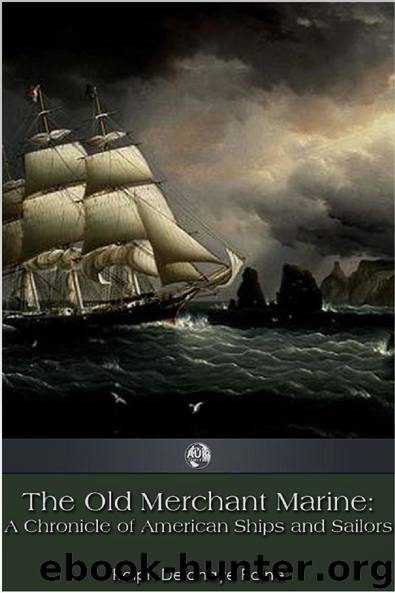The Old Merchant Marine by Ralph Delahaye Paine

Author:Ralph Delahaye Paine
Language: eng
Format: epub
Tags: history, american, ships, sailors, salem port, colonial, yankee, privateers, pirates, sea, ocean, marine, naval, navy
ISBN: 9781781665503
Publisher: Andrews UK Limited 2012
Published: 2012-06-18T00:00:00+00:00
CHAPTER VII. THE BRILLIANT ERA OF 1812
American privateering in 1812 was even bolder and more successful than during the Revolution. It was the work of a race of merchant seamen who had found themselves, who were in the forefront of the world's trade and commerce, and who were equipped to challenge the enemy's pretensions to supremacy afloat. Once more there was a mere shadow of a navy to protect them, but they had learned to trust their own resources. They would send to sea fewer of the small craft, slow and poorly armed, and likely to meet disaster. They were capable of manning what was, in fact, a private navy comprised of fast and formidable cruisers. The intervening generation had advanced the art of building and handling ships beyond all rivalry, and England grudgingly acknowledged their ability. The year of 1812 was indeed but a little distance from the resplendent modern era of the Atlantic packet and the Cape Horn clipper.
Already these Yankee deep-water ships could be recognized afar by their lofty spars and snowy clouds of cotton duck beneath which the slender hull was a thin black line. Far up to the gleaming royals they carried sail in winds so strong that the lumbering English East Indiamen were hove to or snugged down to reefed topsails. It was not recklessness but better seamanship. The deeds of the Yankee privateers of 1812 prove this assertion to the hilt. Their total booty amounted to thirteen hundred prizes taken over all the Seven Seas, with a loss to England of forty million dollars in ships and cargoes. There were, all told, more than five hundred of them in commission, but New England no longer monopolized this dashing trade. Instead of Salem it was Baltimore that furnished the largest fleet - fifty-eight vessels, many of them the fast ships and schooners which were to make the port famous as the home of the Baltimore clipper model. All down the coast, out of Norfolk, Wilmington, Charleston, Savannah, and New Orleans, sallied the privateers to show that theirs was, in truth, a seafaring nation ardently united in a common cause.
Again and more vehemently the people of England raised their voices in protest and lament, for these saucy sea-raiders fairly romped to and fro in the Channel, careless of pursuit, conducting a blockade of their own until London was paying the famine price of fifty-eight dollars a barrel for flour, and it was publicly declared mortifying and distressing that "a horde of American cruisers should be allowed, unresisted and unmolested, to take, burn, or sink our own vessels in our own inlets and almost in sight of our own harbors." It was Captain Thomas Boyle in the Chasseur of Baltimore who impudently sent ashore his proclamation of a blockade of the United Kingdom of Great Britain and Ireland, which he requested should be posted in Lloyd's Coffee House.
A wonderfully fine figure of a fighting seaman was this Captain Boyle, with an Irish sense of humor which led him to haunt the enemy's coast and to make sport of the frigates which tried to catch him.
Download
This site does not store any files on its server. We only index and link to content provided by other sites. Please contact the content providers to delete copyright contents if any and email us, we'll remove relevant links or contents immediately.
| Automotive | Aviation |
| History | Mass Transit |
| Owner's Manuals & Maintenance Guides | Railroads |
| Reference | Ships |
Small Unmanned Fixed-wing Aircraft Design by Andrew J. Keane Andras Sobester James P. Scanlan & András Sóbester & James P. Scanlan(32151)
Navigation and Map Reading by K Andrew(4563)
Endurance: Shackleton's Incredible Voyage by Alfred Lansing(3859)
Wild Ride by Adam Lashinsky(1662)
And the Band Played On by Randy Shilts(1626)
The Box by Marc Levinson(1604)
Top 10 Prague (EYEWITNESS TOP 10 TRAVEL GUIDES) by DK(1572)
The Race for Hitler's X-Planes: Britain's 1945 Mission to Capture Secret Luftwaffe Technology by John Christopher(1533)
The One Percenter Encyclopedia by Bill Hayes(1471)
Girls Auto Clinic Glove Box Guide by Patrice Banks(1370)
Trans-Siberian Railway by Lonely Planet(1352)
Looking for a Ship by John McPhee(1325)
Batavia's Graveyard by Mike Dash(1307)
Fighting Hitler's Jets: The Extraordinary Story of the American Airmen Who Beat the Luftwaffe and Defeated Nazi Germany by Robert F. Dorr(1306)
Troubleshooting and Repair of Diesel Engines by Paul Dempsey(1289)
Bligh by Rob Mundle(1279)
TWA 800 by Jack Cashill(1257)
The Great Halifax Explosion by John U. Bacon(1234)
Ticket to Ride by Tom Chesshyre(1233)
